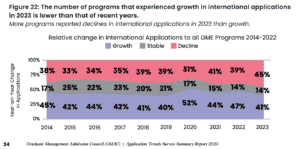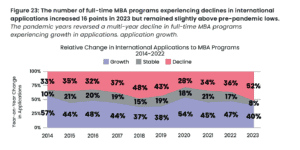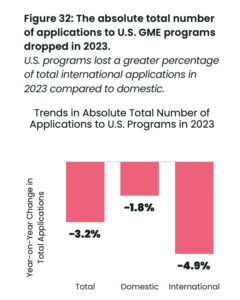After a number of years of business schools reporting upticks in international application numbers, growth for many is beginning to slow, according to research by the Graduate Management Admission Council.
The group’s membership, made up of graduate business schools worldwide, reported that the majority of US programs saw growth in applications, largely bolstered by domestic candidates, while most European programs have faced declining applications over the past three years.
In 2023, the latter witnessed a “pronounced” 13% drop in international applications, according to the survey.
Absolute total number of applications to Canada increased in 2023, though most Canadian programs still reported declines, the survey added.
The Applications Trends Survey garnered responses from 247 business schools in 32 countries between June and August about 893 programs.
The total sample includes 413 MBA programs, 456 business master’s programs, five postgraduate programs and 19 doctoral programs.
The survey found that the pipeline of international students “is a bit smaller in 2023” when compared with last year, and yet it has not “reached the lows seen among international applications to MBA and business master’s programs prior to the pandemic”.
The 2023 dip after “relatively high numbers” of programs seeing applications growth in 2021 and 2022 could be a leveling off, the report suggested. However, it forecasts a “relatively stable source of international applicants to programs worldwide” over the next decade.
The paper says full-time MBA programs – which saw a greater boost from international applications during the pandemic – have a “more pronounced trend” in the pipeline of international students than other programs.
However, the number of MBA programs reporting international application declines increased 16 points in 2023 on last year’s figures, as did business master’s programs although not to the same extent.
“In 2023, 42 percent of business master’s programs reported growth in applications from international candidates compared to 48 percent that experienced declines,” the report said.
While international students “might be more limited than domestic students in pairing [Graduate Management Education] with full-time or part-time work”, evening (53%) and hybrid (54%) business master’s programs reported growth in applications from international candidates, it added.
Online business master’s programs “do not appear to offer the same appeal” among international applicants, as only 24% of programs reported growth.
However, among all candidates (including domestic) online, hybrid or evening options were “much more likely to report application growth”, GMAC reported.
According to Joy Jones, CEO of GMAC, the business school community is continuing to “quickly adapt” to changes to preferences for educational offerings.
“From degreed programs to new certificates, concentrations, executive education and micro-credentials, there is a wealth of options appealing to a wide spectrum of candidates in different stages of career and life,” Jones said.
“It serves as a testament to how business schools rise to the challenge to meet the needs of today’s business school aspirants who will undoubtedly benefit from graduate business education.”
In the US, total international applications for Graduate Management Education programs declined by 4.9%, with 45% of programs reporting growth down from 54% last year.
More US programs reported growth in domestic applications than declines in 2023, with the number reaching a decade-long high, not taking into account the 2020 pandemic boom year.
“However, over the past few years, international applications to U.S. programs have rebounded from declines from approximately 2017 to 2019 – when U.S. immigration policy and sentiment were less favorable for international students,” the report added.
Overall GMAC found that ‘more selective’ programs had seen application declines while ‘somewhat selective’ counterparts tended to report growth in their applications.














